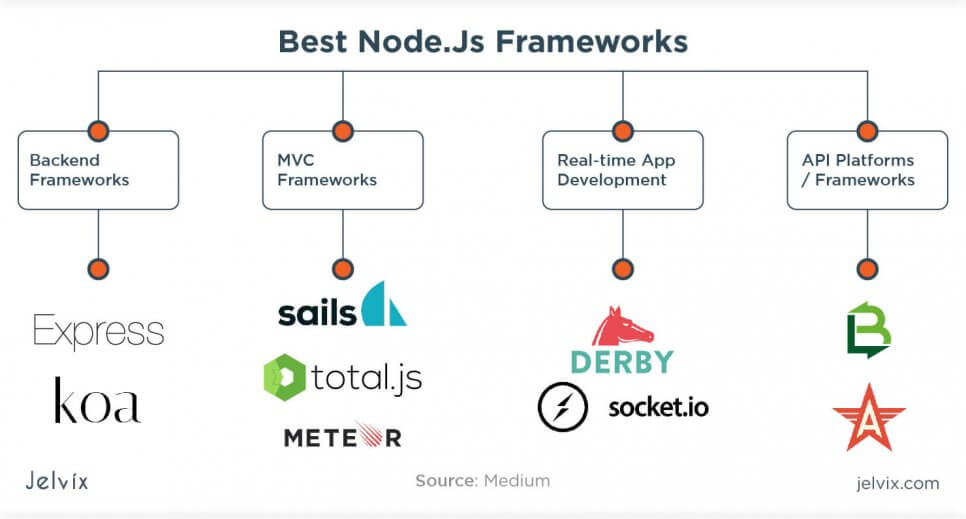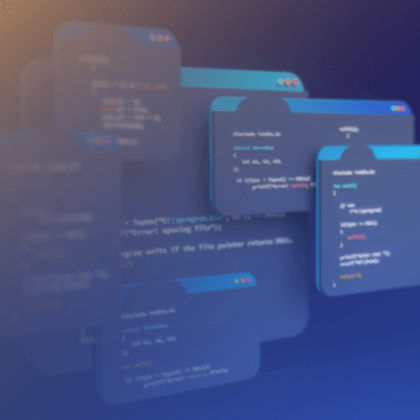Development frameworks are used to organize the development progress. Developers get a ready structure for their code base, can apply reusable elements, and increase the speed of product development.
Using web frameworks for the frontend is common—developers rely on them to work with JavaScript. Leveraging frameworks for the Node.js backend is somewhat less common, but it is just as helpful. When working on web development projects, we apply frameworks to both the client side and server side—because this is highly efficient and convenient.
How to Choose the Best Node.js Framework?
When we choose the best Node JS framework for our projects, we always pay attention to determining factors. Normally, it takes experience to select the fitting Node.js framework for a particular task, but there are some rules that work well for all products.
Scalability
Node.js web frameworks provide a defined structure for a codebase. In the long run, they decide what characteristics your product will have, how the app will process the data, and handle computing. You want a framework that isn’t too opinionated – it shouldn’t limit you in possible ways of executing the project. If the framework boxes you one method, it definitely is not good enough.
On the other hand, you want to be able to use packages, Node.js libraries, and reusable code frameworks. This is where the ecosystem comes in. You want a framework with an actively contributing community, educational materials, and the one used across many industries.
Functionality
If you define quality standards for your Node JS framework selection early on, you’ll have an easier time narrowing down the options. The list of optimal functionality is certainly subjective for each development project – still, we have selected our favorites to give you an idea of the big picture.
- Support of declarative programming: This type of programming describes the platform defined by a feature and its solution. We prefer frameworks that support declarative metadata describing the parameters and middleware of Node.js handlers.
- Cluster management: It’s nice when a framework allows organizing, previewing, editing, and managing clusters, as well as sorting them by their characteristics.
- Middleware support: Middleware is software that helps developers improve their applications’ performance, security, and other aspects. It’s not a framework, but it can be integrated. Middleware helps optimize application functionality and deliver a better experience.
- Batch support: Not all frameworks are equally good at handling multiple background processes simultaneously. We prefer frameworks that let us access the same databases and API caches, regardless of whether they are currently running. This allows us to accomplish multiple tasks as soon as possible.
Learn more about the main stages of product development lifecycle to build a sustainable product.
Best Node.js API Frameworks
We will review the best Nodejs frameworks, describing their respective advantages and use cases. We have analyzed statistics, functionality, use cases, and advantages to compile this list.
Express.js
Express.js is one of the most popular frameworks for Node.js. It allows reusing code to process data in web applications, storing user sessions, managing cookie files, and handling the payload. Without a framework, Node.js requires you to rewrite a lot of repetitive processes from scratch.
Express combines Node.js API frameworks with browser-specific APIs that aren’t normally supported by the runtime environment. You can connect the back-end code to the browser and store certain files directly in the browser. This is why Express is a top choice for dynamic content. It quickly responds to users’ requests, uploads text, images, videos, and other content on the page.
Advantages of Express.js:
- Easy route handling with URLs and HTTP protocol;
- Supports middleware, allowing developers to install helpful tools for speed, responsiveness, and performance improvement;
- Supports multiple template engines;
- Works well with both static and dynamic content;
- Easily integrates with SQL and NoSQL databases;
- As one of the most popular Node.js frameworks, it has a rich open-source ecosystem.
Companies that use Express.js
- BlaBlaCar
- Accenture
- Uber
Meteor.js
Meteor.js has a reputation for being a go-to Node.js framework for fast development. Its packages and libraries have a lot of reusable components. You will be presented with a very clear structure that will allow you to get your project off the ground in several weeks.
The framework can be integrated with Cordova, which means developers can build native mobile apps while reusing Meteor’s code. That said, Meteor is hardly the best option for complex long-term projects; the framework’s ecosystem has the reputation of being a ghost town—it’s becoming less popular over the years. Still, it’s a good choice for time- and cost-efficient solutions.
Advantages of Meteor.js:
- A fast Node.js framework for MVP development and prototype;
- Smart packages: a single command can be used to connect multiple features;
- Small codebase: in Meteor, developers can get quite a lot of functionality with only a few lines of code.
Companies that use Meteor.js
- Slack
- Accenture
- Honeywell
Koa.js
Koa is one of the simplest Node.js frameworks out there. It’s elegant and lightweight. On top of that, the installer file doesn’t feature a built-in templating tool or router. Many Express plugins and libraries have been adapted to Koa. It’s similar to Express, only simpler and slightly less universal.
Koa is not hugely popular among enterprises, and it’s considered a startup solution that offers a lightweight approach to web development. The framework mainly gained traction when Express wasn’t updated for some time, but now, after Express’ team resumed active support, the framework is losing its initial traction.
Advantages of Koa.js
- Koa.js doesn’t use callbacks, unlike Express and other frameworks, which allows avoiding callback chaos;
- Easier error handling: developers can spot technical issues with a try/catch command;
- Koa doesn’t have a built-in middleware that could make the application heavier and slow down the software;
- Many Express packages and libraries are translated to Koa, so Koa developers get to benefit from Express’ rich ecosystem;
- Koa doesn’t spam middleware; in the situations where other frameworks require another layer of software, Koa allows simply writing functions instead;
Companies that use Koa
- Bulb;
- GAPO
Sails.js
Sails.js is a popular framework for small projects. Similarly to Meteor, it doesn’t have the most active community which was probably affected by the absence of any recent updates. However, that aside, Sails is an elegant framework that integrates well with JS frameworks and databases.
Its model-view-controller is similar to what Ruby on Rails offers but supports more data requests. It’s a popular choice for real-time services and data-based applications. The framework is known for its ability to automatically generate RESTful APIs with JSON support and default HTTP handling.
Advantages of Sails.js
- Sails is one of the most popular Node.js MVC frameworks;
- The framework supports multiple databases simultaneously;
- Sails has multiple integrations and plugins, and has a solid support of Angular;
- The framework automatically generates REST APIs;
Companies that use Sails.js
- Lithium Technologies
- Greendeck
Nest.js
Nest.js is a framework that uses JavaScript, TypeScript, and supports various programming paradigms like Functional Programming, Object-Oriented Programming, and Reactive Programming. It can be integrated with other Node.js frameworks, notably Express.
The framework’s architecture is hugely inspired by Angular; the logic behind providers, controllers, pipes, and interceptors is similar to Angular’s structural solutions. Developers familiar with Angular will find Nest easy to master.
Advantages of Nest.js
- Integration with Express: add-ons and packages for Express can be easily reused for Nest;
- Smooth integration with Angular: teams that use Angular for front-end development, will have no issues connecting Nest to their codebase;
- A quickly-growing community: many Node.js frameworks had their growth peak back in 2013, but Nest.js keeps the momentum and can now easily compete with Express;
- Ready-to-use patterns: Nest.js is a highly predefined framework that does a lot of basic development activities for developers;
- Fast performance;
- Easy-to-learn: If you have used Angular or Express before, you can easily switch to Nest.
Companies that use Nest.js
- Adidas
- Autodesk
- Neoteric
- Sanofi
LoopBack.js
An open-source Node.js framework that provides ready-made modules to connect Node.js to APIs of HTML5, iOS, and Android. With LoopBack, applications can record data, upload files, create emails, create push notifications, register users, and request information from databases.
The application supports SQL and NoSQL databases, allowing for the conversion of web applications to mobile apps, running the software locally or in the cloud, and adjusting the push notifications settings.
Updates in LoopBack 4 are significant, including new features, active community contributions, and IBM support for keeping the framework relevant for modern API development and enterprise applications.
Advantages of LoopBack.js:
- Rich built-in modules: Developers can use CRUD APIs and ready code fragments for tasks like defining user management and access permissions or interacting with server- and client-side APIs;
- Organized code: LookBack is an opinionated network that limits users in their coding freedom. While such an approach limits creative possibilities, it also offers a well-defined structure and increases the development speed.
- A lot of built-in functionality: predefined functionality is already enough to build a simple project;
- Accessible official support: the company that developed the platform has been acquired by IBM and is now supported by its official team;
- A code that defines relations and models is stored in a separate JSON file.
Companies that use LoopBack.js
- GoDaddy;
- Department of Energy of the United States;
- Symantec
Hapi
Hapi.js has the reputation of being a safety-focused Node.js framework, and we can confirm that it is. The team clearly prioritized code quality control and verification over extensive functionality but ultimately came up with a great mix.
First and foremost, Hapi checks each installed npm package. We already discussed how problematic Node Package Manager content could be – Hapi solves this issue by running a security test. Hapi focuses on enabling advanced cookie functionality, secure HTTPs, and authorization settings.
All security updates in Hapi’s development have a clearly defined immutable ownership. If something goes wrong, developers know whom to hold accountable. Hapi also offers a collection of plugins, although not as many as in Express or Nest.
Hapi’s advantages
- Doesn’t require middleware to perform many essential and advanced tasks;
- An in-built algorithm for creating and processing cookie files;
- High-performance stability and safety: the framework was designed for a Walmart team to support increased traffic during Black Fridays;
- Flexible RSS memory, event loop day, and V8 heap;
- Suitable for microservice development: Hapi itself is built as a microservice and uses an HTTP protocol for communication.
Companies that use Hapi
- Gozova
- Boodle
Adonis.js
Adonis.js is a relatively new Node.js framework for microservices development. The tool itself consists of multiple packages that run the server-side of the application. The framework provides quite a lot of abstraction over Node.js – you won’t be working with typical runtime’s syntax.
The framework was hugely inspired by Laravel, so developers who worked with this PHP framework will perhaps have the easiest time transferring to Adonis.js.
Advantages of Adonis.js
- Adonis has native support of Express, MEAN, and Koa;
- Adonis.js is not an opinionated framework – it can be compared to Vue.js by the degree of freedom;
- Developers can customize WebSocket, ORM, routing, JWT, and other features;
- Adonis.js is the first Node.js framework to support JSON APIs natively;
- Flexible template engine for dynamic content delivery.
Companies that use Adonis:
- Caravelo
- R5Stats
- Synergy Global Network
Keystone.js
It’s a framework for static and dynamic content management that is commonly used for content-heavy web projects. Information portals, content management systems, online editorials, forums, social media, and e-commerce platforms are the most common applications of Keystone.
Keystone consists of a range of modules, supporting core functionality as a Javascript back-end framework, as well as UI tools, web protocols, and Mongoose—a database object modeling tool for MongoDB in Node.js.
Advantages of Keystone.js:
- A flexible tool for dynamic Node.js development that can handle large masses of content quite well and easily;
- Intuitive UI that consists of decentralized modules;
- Smart data models enabled by native Mongoose support;
- A real-time framework for managing, tracking, and publishing updates;
- A native add-on for image editing, storage, and management;
- Location tracking with Google Places;
- Intuitive embedding with Embedly.
Companies that use Keystone.js
- Sony
- Vodafone
- Macmillan
Total.js
Total.js started as a Node.js framework for real-time applications, REST servers, e-commerce platforms, and Internet of Things projects, but it has now become an entire platform. The platform combines the functionality of the platform and library, providing, on the one hand, an established structure for a web project and, on the other hand, reusable functionality codebases for different types of projects.
The platform offers more than 100 services for JavaScript development, cloud computing, code sharing, cooperation, and UI development.
Advantages of Total.js:
- Computing services and support of cloud deployment;
- An active open-source community;
- Code editor;
- Thousands of custom Node.js libraries;
- A framework precisely describes the structure of content management systems, forums, information portals – developers can start building solutions right away;
- Support of classical and dynamic routes; developers can use the existing ones or edit WebSocket on their own;
- A built-in mechanism for automatic compression of HTML, CSS, JavaScript, HTML.
Companies that use Total.js
- Medium
- CapitalOne
- Trello
Conclusions
Although Node.js frameworks are technically not essential for back-end development, they make a huge difference in development efficiency, product performance, and code quality. Having access to predefined templates, libraries, and middleware allows developers to save time on writing repetitive code, getting through thousands of callbacks, and struggling to integrate Node.js with front-end frameworks.
We can’t definitively say which is the best and most popular JavaScript framework for 2024, although we do have our favorites. When a Node.js project comes along, we always base our choice on the product’s needs and characteristics. Some frameworks are better equipped to handle dynamic content, while others fit best for MVP development.
A professional team can pinpoint the key product characteristics and consider them when choosing a framework. You are always welcome to talk to our team to get a third opinion on the project’s tech stack.
Need help?
Leverage the top skills and resources to scale your team capacity.






















